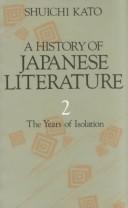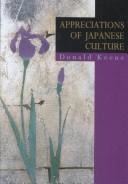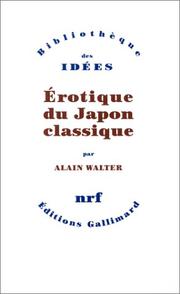| Listing 1 - 10 of 103 | << page >> |
Sort by
|
Book
ISBN: 9781107029033 9781139245869 Year: 2016 Publisher: Cambridge Cambridge University Press
Abstract | Keywords | Export | Availability | Bookmark
 Loading...
Loading...Choose an application
- Reference Manager
- EndNote
- RefWorks (Direct export to RefWorks)
J5500 --- Japan: Literature -- general, history and criticism
Book
ISBN: 9782850830167 285083016X Year: 2020 Volume: [55] 80 Publisher: Paris Le point
Abstract | Keywords | Export | Availability | Bookmark
 Loading...
Loading...Choose an application
- Reference Manager
- EndNote
- RefWorks (Direct export to RefWorks)
Qu’est-ce qui caractérise le mieux le Japon aux yeux d’un Occidental ? Ses geishas, ses pagodes, ses ponts voûtés dans des jardins moussus aux couleurs d’automne, ses samouraïs, ses mangas, ses sushis, les romans de Murakami ? De tous les pays asiatiques le Japon est celui qui a le plus influencé l’Occident. Mais que connaît-on vraiment de sa culture, de ses croyances, de ses icônes ?Le Point Références vous invite à découvrir cet archipel qui n’a cessé de surprendre. Comment un pays encore féodal a-t-il réussi, en moins de trente ans, à se moderniser suffisamment pour prétendre attaquer la Chine, la pesante puissance voisine et, dans la foulée, l’Empire russe ? Pourquoi plonge-t-il alors dans une dictature mystique centrée sur la guerre de l’empereur ? Pourquoi est-ce la femme de cour qui fait du japonais une langue littéraire ? Autant d’énigmes que la lecture des textes considérés comme des classiques par les Japonais aide, peut-être, à résoudre.De dame Shônagon à Yasushi Inoue, des palais Heian et de Kyoto aux buildings de Tokyo, ce hors-série vous entraîne dans une balade entre roman, haïku spectacle nô et philosophie, où les dramaturges écrivent pour des marionnettes, les moines composent des poèmes, les philosophes se dopent à la physique quantique et les femmes, toujours les femmes, sont les maîtresses de l’érotisme.
Book
ISBN: 9782130812227 2130812228 Year: 2019 Publisher: Paris Que sais-je?
Abstract | Keywords | Export | Availability | Bookmark
 Loading...
Loading...Choose an application
- Reference Manager
- EndNote
- RefWorks (Direct export to RefWorks)
Book
ISBN: 4901558315 Year: 2006 Publisher: Kyoto International research center for Japanese studies
Abstract | Keywords | Export | Availability | Bookmark
 Loading...
Loading...Choose an application
- Reference Manager
- EndNote
- RefWorks (Direct export to RefWorks)
Japanese literature --- Literature --- Philosophy. --- J5509 --- J5500 --- Japan: Literature -- theory, methodology and philosophy --- Japan: Literature -- general, history and criticism --- E-books

ISBN: 0870114913 9780870114915 0333198824 Year: 1979 Publisher: London Macmillan
Abstract | Keywords | Export | Availability | Bookmark
 Loading...
Loading...Choose an application
- Reference Manager
- EndNote
- RefWorks (Direct export to RefWorks)
Japanese literature --- Japanese literature. --- History and criticism. --- -Japanse literatuur --- 895.6 --- J5500 --- J5500.10 --- J5500.40 --- -895.6 Japanse literatuur --- Japanse literatuur --- Japan: Literature -- general, history and criticism --- Japan: Literature -- history and criticism -- premodern, ancient and earliest --- Japan: Literature -- history and criticism -- Kamakura period, Yoshino (1185-1392) and Chūsei in general (1185-1600) --- History and criticism --- -History and criticism
Book
ISBN: 0691101469 0691053790 0691629145 0691612455 Year: 1984 Publisher: Princeton Princeton university press
Abstract | Keywords | Export | Availability | Bookmark
 Loading...
Loading...Choose an application
- Reference Manager
- EndNote
- RefWorks (Direct export to RefWorks)
This book, which covers the period from preliterate times to the beginning of the tenth century, is the first of five proposed volumes that will give an account of Japanese literature from its beginnings to the death of the modern novelist Mishima.Originally published in 1984.The Princeton Legacy Library uses the latest print-on-demand technology to again make available previously out-of-print books from the distinguished backlist of Princeton University Press. These editions preserve the original texts of these important books while presenting them in durable paperback and hardcover editions. The goal of the Princeton Legacy Library is to vastly increase access to the rich scholarly heritage found in the thousands of books published by Princeton University Press since its founding in 1905.
J5500 --- J5500.10 --- J5500.40 --- Japan: Literature -- general, history and criticism --- Japan: Literature -- history and criticism -- premodern, ancient and earliest --- Japan: Literature -- history and criticism -- Kamakura period, Yoshino (1185-1392) and Chūsei in general (1185-1600) --- Knowledge, Theory of --- Epistemology --- Theory of knowledge --- Philosophy --- Psychology --- History --- England --- Intellectual life --- Théorie de la connaissance --- Histoire --- Angleterre --- Vie intellectuelle --- Japanese literature --- History and criticism.
Book
ISBN: 0333275934 Year: 1983 Publisher: London Macmillan
Abstract | Keywords | Export | Availability | Bookmark
 Loading...
Loading...Choose an application
- Reference Manager
- EndNote
- RefWorks (Direct export to RefWorks)

ISBN: 4770009569 Year: 1981 Publisher: Tokyo Kodansha international
Abstract | Keywords | Export | Availability | Bookmark
 Loading...
Loading...Choose an application
- Reference Manager
- EndNote
- RefWorks (Direct export to RefWorks)
Japanese literature --- Littérature japonaise --- History and criticism --- Histoire et critique --- Japan --- Japon --- Civilization. --- Civilisation --- J5500 --- Japan: Literature -- general, history and criticism
Book
ISBN: 9781138792296 9781315762210 9781317647706 9781317647713 1138792292 9780367355739 0367355736 1315762218 1317647718 1317647726 9781317647720 131764770X Year: 2016 Publisher: Milton Park, Abingdon, Oxon
Abstract | Keywords | Export | Availability | Bookmark
 Loading...
Loading...Choose an application
- Reference Manager
- EndNote
- RefWorks (Direct export to RefWorks)
The Routledge Handbook of Modern Japanese Literature provides a comprehensive overview of how we study Japanese literature today. Rather than taking a purely chronological approach to the content, the chapters survey the state of the field through a number of pressing issues and themes, examining the ways in which it is possible to read modern Japanese literature and situate it in relation to critical theory. The Handbook examines various modes of literary production (such as fiction, poetry, and critical essays) as distinct forms of expression that nonetheless are closely interrelated. Attention is drawn to the idea of the bunjin as a 'person of letters' and a more realistic assessment is provided of how writers have engaged with ideas--not labelled a 'novelist' or 'poet', but a 'writer' who may at one time or another choose to write in various forms. The book provides an overview of major authors and genres by situating them within broader themes that have defined the way writers have produced literature in modern Japan, as well as how those works have been read and understood by different readers in different time periods. The Routledge Handbook of Modern Japanese Literature draws from an international array of established experts in the field as well as promising young researchers. It represents a wide variety of critical approaches, giving the study a broad range of perspectives. This handbook will be of interest to students and scholars of Asian Studies, Literature, Sociology, Critical Theory, and History.

ISBN: 2070732177 9782070732173 Year: 1994 Volume: *22 Publisher: Paris Gallimard
Abstract | Keywords | Export | Availability | Bookmark
 Loading...
Loading...Choose an application
- Reference Manager
- EndNote
- RefWorks (Direct export to RefWorks)
Erotica --- Eroticism --- Erotiek --- Erotisme --- J5500.10 --- Japan: Literature -- history and criticism -- premodern, ancient and earliest --- Erotic literature, Japanese --- Japanese literature --- Japanese erotic literature --- History and criticism --- Sex customs --- Japan --- History
| Listing 1 - 10 of 103 | << page >> |
Sort by
|

 Search
Search Feedback
Feedback About UniCat
About UniCat  Help
Help News
News